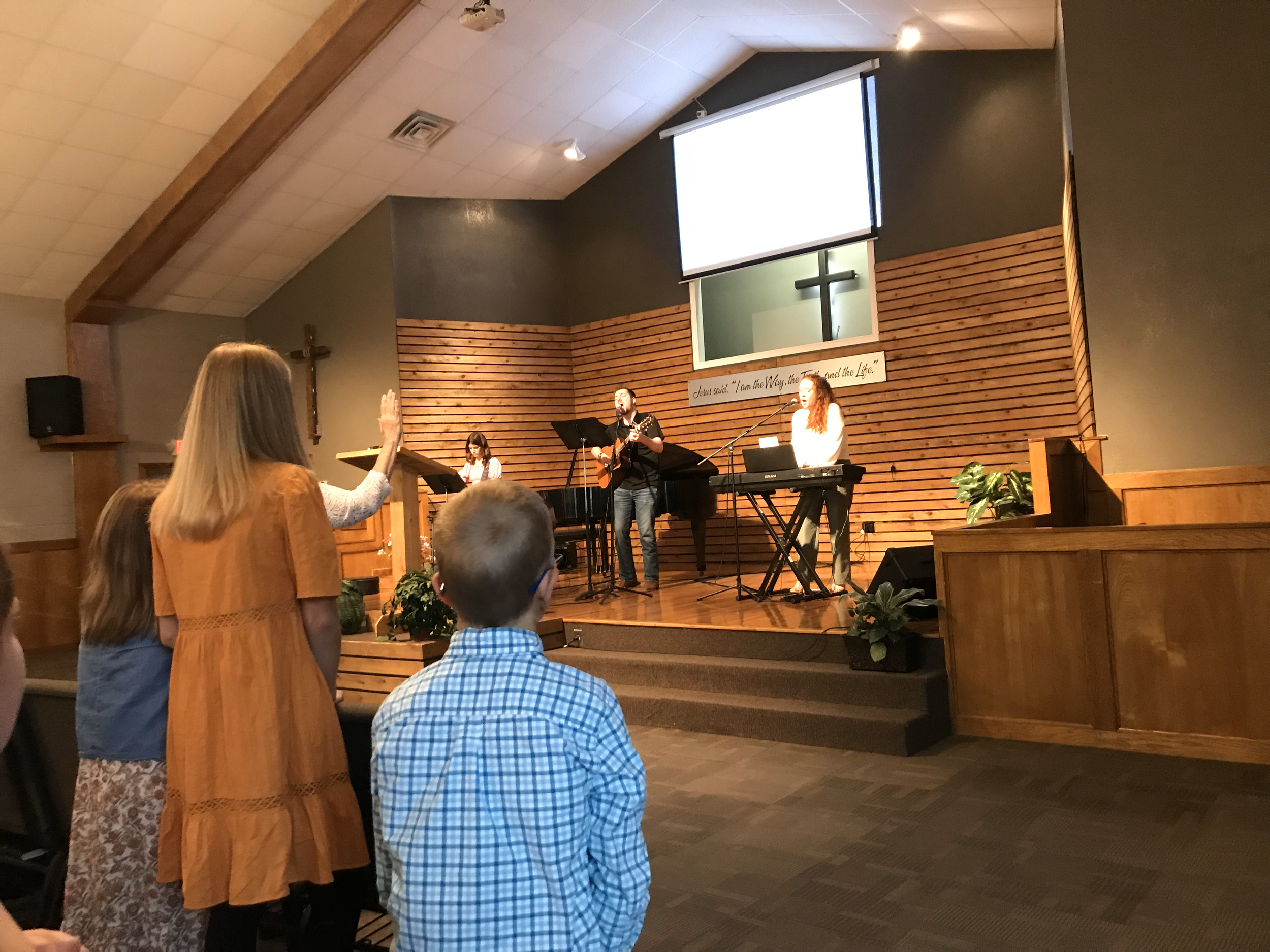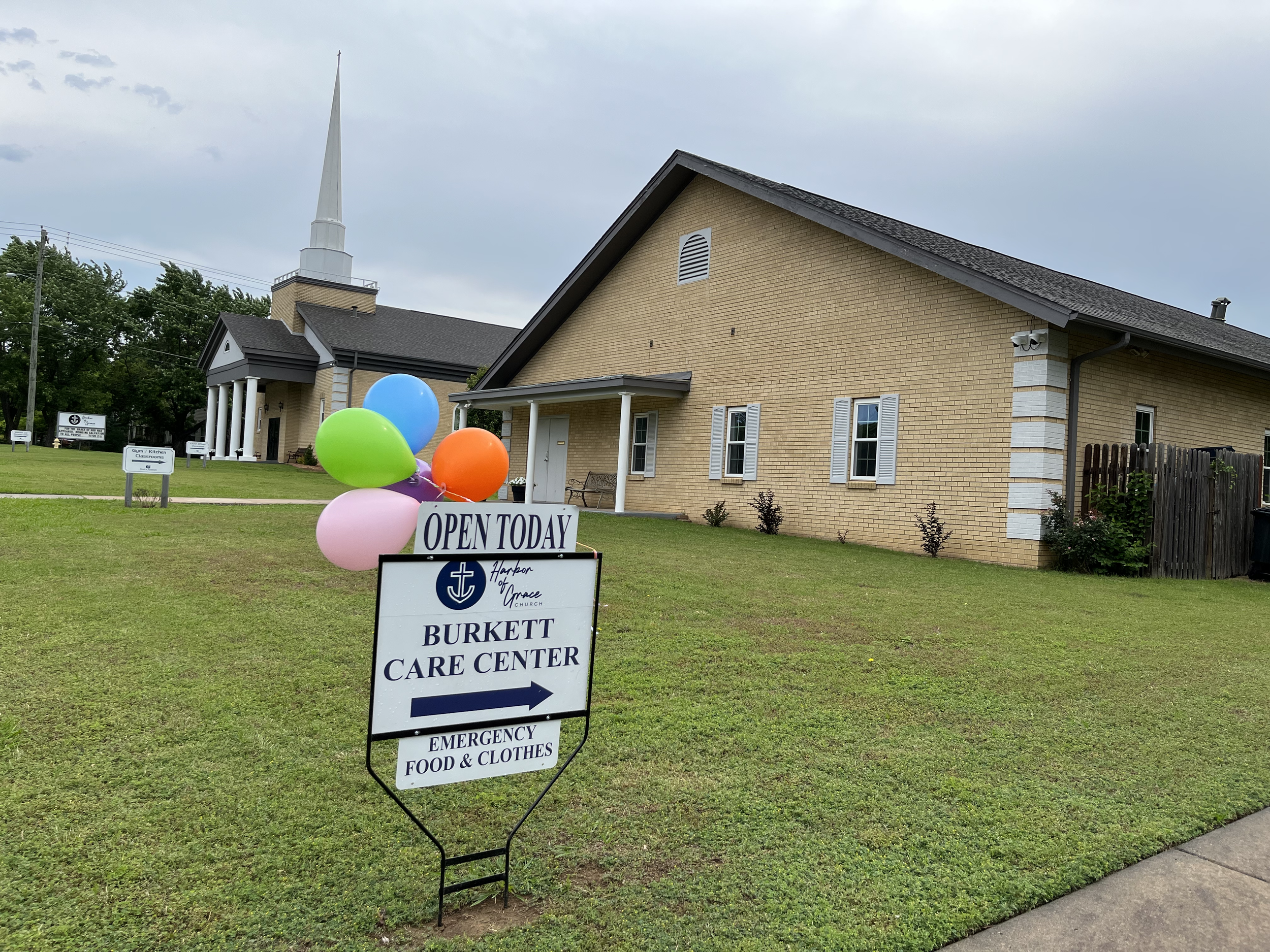







What to Expect at HGC
The atmosphere is warm and welcoming, and after a time of fellowship our service begins with a call to worship where we spend time in prayer before the Lord, preparing our hearts for worship. Corporate prayer and corporate singing precede the reading and preaching of the Word, all of which are foundational expressions of worship at HGC. A few of our core commitments, shown below, are what shape the life and ministry of our church.
Love the Living Word
Worship at Harbor of Grace is centered around the word of God which we pray, sing, preach, and admire. To love and obey the written and the Living Word is to see the Bible as authoritative and true, and to see Christ as both our tender Savior and Lord.
Serve Others
We believe that Christ is honored in the humble cooperation of gospel believing churches who labor together to love and serve people, and to spread the hope of Jesus Christ.
Equip the Saints
When believers assemble regularly to worship and pray, it is not only a time to admire and worship God, but to be equipped for the ministry so that the body might be built up in unity and maturity. To equip the saints is to see them growing up in every way in Christ, ever growing in holiness, love, faith, knowledge, and confidence in proclaiming the gospel with charity, clarity, and conviction.
What We Teach
Doctrine of God
We believe in and worship one God eternally existing as one essence and three distinct persons: God the Father, God the Son, and God the Holy Spirit, each of whom in full unity in Trinity is fully God.
The entire Christian faith is bound together with the confession of God’s Trinitarian nature (Matt. 28:18-20).
We believe in God the Father, the Creator of heaven and earth, who, according to His great mercy, has caused us to be born again to a living hope through Christ His Son (1 Peter 1:3-5).
We believe in the Son, God from God, eternally begotten, but not made, who in history took on a human nature for the sake of our salvation (John 1:14; Heb. 1:3). He is fully God and fully man. Through Him, all things came into being and were created. He was before all things, and in Him, all things hold together by the word of His power (Col.1:15-20). He, Jesus, (born of a virgin, lived a sinless life) suffered, died, was buried, resurrected bodily, ascended and sits at the right hand of the Father until He returns for the final judgment and consummation of the Kingdom.
We believe in the Holy Spirit, who eternally proceeds from the Father and the Son and is sent by the Father and Son to give new life (John 15:26-27). The Holy Spirit unites believers to Jesus Christ by grace through faith, bringing about the new birth and dwells within the regenerate (Eph. 1:13-14, 2:8-9, 4:4-5). The Holy Spirit has come to glorify the Son who, in turn, came to glorify the Father. He will lead the Church into a right understanding and rich application of the truth of God’s Word. He is to be respected, honored and worshiped as God, the third person of the Trinity.
The triune God (Father, Son, and Spirit) is the Creator of all things, visible and invisible. As the immutable, immortal, and eternal Creator, He sovereignly rules over all His creation, in heaven and on earth (Ps. 24:1).
Doctrine of Revelation
God has made Himself known to the world in Jesus Christ, the Scriptures, and creation.
We believe that God has made Himself known to His creation in three distinct ways. He has revealed Himself through His creation, which declares His greatness and power (Rom. 1:20). He has revealed Himself to us in His Son, the incarnate Word (Heb.1:1-2). His Son is the living Word about whom all of Scripture testifies. God has revealed Himself through Scripture, the inspired and written Word (2 Tim. 3:16), without which no man may come to know the salvation of God (1 Peter 1:23-25; Rom. 10:14).
We believe that Jesus Christ, the Son of God, is the perfect revelation of who God is. Jesus Christ is the “image of the invisible God” (Col. 1:15), “the exact imprint of his nature” (Heb. 1:3), and a perfect reflection of God the Father (John 5:19).
We believe the Scriptures, the 66 books of the Old and New Testaments, are the inspired Word of God and are therefore without error in their original writings. These 66 books alone constitute the inspired Word of God, being plenary, inerrant, and infallible, and therefore utterly authoritative. The Scripture is sufficient for all that God requires for us to believe and do. It is to be believed as God’s instruction in all that it teaches; obeyed, as God’s command, in all that it requires; and trusted, as God’s pledge, in all that it promises (Is. 40:6-8). As God’s people hear, believe, and obey the Word, they are equipped as disciples of Christ and witnesses to the gospel (Rom. 10:14-17).
Doctrine of Creation and Providence
We believe that all that exists in the universe, whether material or immaterial, has been created by God from nothing, and that all of creation is continually sustained by both the general and particular governance and providence of God.
All that exists in the universe, whether material or immaterial, has been created by God from nothing (Gen. 1:1-2; Ps. 24:1). God’s creative work is the overflow of the love present within the Trinitarian fellowship. Creation, according to the design of God, was good (Gen. 1:3-31).
It is not that God has designed the world and let life arise through unguided natural processes, rather He is the author and sustainer of life, and the universe continually depends upon His governance and sustaining power. He upholds the universe by the word of His power, and He holds the world together in Himself (Col. 1:17). He governs and provides for all of creation generally, and for his children particularly (1 Sam. 2:1-10; Psalm 19:1-8; Rom. 8:28), and whatever trials come to us are by God’s appointment for His glory and our good.
Doctrine of Humanity
We believe that all humanity is created in the image of God and possesses intrinsic dignity and worth.
God made humanity—male and female—in His own image (Gen. 1:27-30). Set apart as His image bearers, every human being is sacred from the moment of conception. All men and all women, bearing the image of God, are meant to represent God in His creation (1 Cor. 10:31). God declares the created order to be very good, distinguishing men and women as His agents to care for, manage, and govern it. They enjoy equal access to God by faith in Christ Jesus and are both called to move beyond passive self-indulgence to significant private and public engagement in family, church, and civic life. Adam and Eve were made to complement each other in a one-flesh union in the covenant of marriage that establishes the only God-ordained pattern of sexual relations for men and women, one man and one wife in a lifelong commitment. In God’s wise purposes, men and women are not simply interchangeable, but rather they complement each other in mutually enriching ways created free from sin to live in obedience to God.
Distinctive I Complementarianism
Men and women are absolutely equal in essence, dignity, and value, while being distinct by divine design. As part of God’s good created order, men and women are to have different yet complementary roles and responsibilities in the home and church. As it relates to the church, men and women are both expected to lead, however, the office of elder is reserved for qualified men (1 Tim. 3; Titus 1).
Doctrine of Sin
We believe that through sin, which is rebellion against God, spiritual and physical death entered the world causing guilt, shame, and suffering, leaving the world in desperate need of redemption and reconciliation.
Through the temptation of Satan, humanity voluntarily transgressed the command of God and fell from their original holiness and righteousness (Gen. 3). Now the entire human race inherits a corrupt and depraved nature that is opposed to God and His law (Rom. 3:9-20). Therefore, without redemption and reconciliation, all humans are under condemnation in their willful rebellion and unbelief (John 3:18). This depravity is radical and pervasive. It extends to the mind, will, body, and affections. Unregenerate humanity lives under the dominion of sin and Satan (Eph. 2:1-3). We believe that there is no neutral or middle ground, either a man is for Christ or he is against Christ (Rom. 5:10; 1 John 4; Matt. 12:30).
Doctrine of Salvation
We believe that salvation is motivated by the love of God and is by grace alone through faith alone in Christ alone.
We believe that, due to universal and spiritual death through sin, we are enemies of God, unable to enter the kingdom of God unless we are born from above (John 3:5-8). We believe that salvation is when, through spiritual regeneration and faith in the work and person of Christ, we are made new in Christ and become reconciled to God, and that all who receive the Lord Jesus Christ through faith are declared righteous by God and become children of God (Heb.10:19-25). We believe that salvation is all of grace, motivated by the love and kindness of God towards His fallen, enslaved, and spiritually dead creatures.
We believe the Scriptures teach that regeneration, or the new birth, is that act of God by which the Holy Spirit imparts a new nature and a new spiritual life, not before possessed, and the person becomes a new creation in Christ Jesus (Gal. 2:20). The regenerate person is brought from death to eternal life and is renewed in the spirit of their minds and given the gift of faith with a new identity created in the likeness of God (Eph. 2:8-9, 4:22-24). Being given a holy disposition and a new desire to serve God, their heart is transformed from a love of sin and self to a love of holiness and God. Regeneration, faith, and repentance are inseparable elements of salvation.
We also believe that when a person has been regenerated and justified by grace through faith, the work of sanctification begins. Sanctification is a work whereby believers cooperate with the purifying work of the Holy Spirit. For the rest of the believer’s life, God will continue the work of sanctification, bringing about gradual growth in holiness and Christ-likeness until the day of Christ, when they will be glorified. Since salvation is of grace, and sanctification is a continual work of God in the believer’s life, there is nothing that can cause a believer to be lost to spiritual death again, even if though for a time they are caught in sin, the believer will, by the power and grace of God, persevere to the end as a child of God, truly a new creation in Christ who possesses eternal life.
Distinctive II Sovereignty of God in Salvation
The salvation of humanity is fundamentally the work of God. Before the foundation of the world, God elected His people, setting His affection and grace upon them (Rom. 8:29-30). In love God predestined His people for adoption (Eph. 1:4-6). Faith is a gift of grace that is given by the mercy and pleasure of God, so that no one may boast (Eph. 2:8-9). Apart from the intervention of God, humanity cannot choose of his own accord to worship God and pursue righteousness (Rom. 3; Eph. 2:1-3). God’s sovereignty in salvation is comprehensive: from first to last, all of salvation is the work of God. We believe that regeneration precedes faith and repentance. Regeneration is the work of the Holy Spirit to bring about a change of heart and will through bringing about spiritual life from that which was previously dead. Faith and repentance are inseparable elements of salvation, meaning the regenerate person will have a change of mind, affections, and commitments, trusting in Christ alone for salvation to live a life of perseverance by grace.
Doctrine of the Church
We believe that the universal Church is the invisible body and bride of Christ, comprised of the full number of elect individuals who will ever trust in Christ for salvation, and the local church is the visible representation of the bride of Christ.
God, by His Word and Spirit, creates the Church, calling sinful humanity into the fellowship of Christ’s body (1 Cor. 12:12-31). The Church universal is made up of all those who have, and whoever will, become genuine followers of Jesus Christ.
The ultimate mission of the Church is to bring glory to God by making disciples (Matt. 28:18-20). The Church is called to make disciples through worship, prayer, teaching of the Word, observance of the ordinances, fellowship, the exercise of our gifts and talents, and the proclamation of the gospel, both in our community and throughout the world.
Ordinances:
We believe there are two ordinances of the Church. One is that of believer’s baptism in the name of the Father, Son, and Holy Spirit, and the other is the Lord’s Supper.
Water baptism is only intended for those who have received the saving benefits of Christ through the new birth of the Holy Spirit. In obedience to Christ’s command and as a testimony to God, the Church, oneself, and the world, believers are baptized by immersion in water, in the name of the Father, Son, and Holy Spirit. Water baptism is a visual and symbolic demonstration of a person’s union with Christ in the likeness of His death and resurrection. It signifies that a former way of life has been put to death and vividly depicts the release from the mastery of Satan, sin, and death. It is to be administered under the authority of the local church, unto the professing believer, by the correct mode, and portraying by symbolism, the correct meaning of being brought from death to life, buried and raised with Christ. With believer’s baptism, it is normative for it to be closely following conversion. While symbolic, it is not simply dead symbolism, but is an event that marks the believer’s communion with and commitment to both the local and universal Church.
As with water baptism, the Lord’s Supper is to be observed only by those who have become genuine followers of Christ, and who have been baptized. This ordinance symbolizes the breaking of Christ’s body and the shedding of His blood on our behalf and is to be observed repeatedly throughout the Christian life as a sign of continued participation in the atoning benefits of Christ’s death. As we come to the table with an attitude of faith and self-examination, we remember and proclaim the death of Christ, receive spiritual nourishment for our souls, and signify our unity with other members of Christ’s body.
We believe that while the bread and wine are symbols rather than the physical body and blood of Christ, the Lord’s Supper is more than mere symbolism. We believe that to observe the Lord’s Supper is to have communion with Christ, who is present spiritually.
Distinctive III The Local Church
We believe the local church is an autonomous congregation of baptized believers who assemble together regularly to worship and observe the two ordinances of Christ. The local church is associated by covenant and committed to living in biblical community according to the Scriptures, being self-governed yet working in cooperation with other congregations to fulfill the great commission and minister to those in need.
We believe in congregational governance, where, under Christ, the ultimate authority rests with the members of a local congregation, who, under the leadership of elders, have the responsibility to protect its membership, teaching, and pulpit. For this reason, we believe that while it is possible to cooperate with other congregations, it is not possible to have one congregation that assembles in multiple locations at once, or at different times on a regular basis, for in these regular yet divided assemblies there exists multiple congregations, and therefore multiple churches.
Distinctive IV Gifts of the Holy Spirit
The gifts of the Holy Spirit are still active within the life of the church today, yet there remains a distinction between the normative display of some gifts during the Apostolic period and today. We believe that God is free to allow any spiritual gift to be demonstrated today as He so ordains for any situation. We believe that some of the gifts demonstrated in the apostolic-era were for confirmational purposes and are not normative today. We do not believe that display of any of those gifts are the inevitable indication of the believer’s fullness in the Holy Spirit or the congregation’s standing in the ministry of God.
Distinctive V Baptism by Immersion
The precedent we find in the New Testament is baptism following conversion by immersion into water. Baptism by immersion is meant to symbolically depict the believer’s real union to Christ in His death and resurrection (Rom. 6:1-14). (For more on this distinctive, consider attending one of our Baptism classes, held several times throughout the year.)
Doctrine of Resurrection and Consummation of the Kingdom of God
We believe that Jesus Christ is returning to the world in the future to judge the living and the dead.
The consummation of all things includes the future, physical, visible, personal, and glorious return of Jesus Christ, the resurrection of the dead, the glorification of those alive in Christ, the judgment of the just and the unjust, and the fulfillment of Christ’s kingdom in the new heavens and the new earth. In the consummation, Satan, with his hosts and all those outside Christ, is finally separated from the benevolent presence of God, enduring eternal punishment (Rev. 20:7-15), but the righteous, in glorious bodies, will live and reign with Him forever, serving Him and giving Him unending praise and glory. Then, the eager expectation of creation will be fulfilled, and the whole earth shall proclaim the glory of God, who makes all things new (Rev. 21:1-5).
